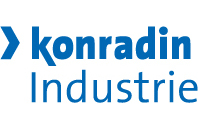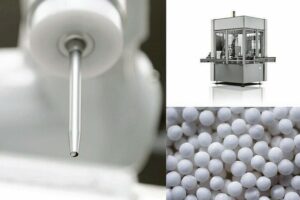More than 80 % of the total cost of ownership of a pump is accounted for by the energy needed to run it. The magnetically coupled centrifugal pumps in the RM series have a compact, energy-efficient drive system with a variable speed. This assures optimum, demand-based fluid control with no wasted energy.
Along with utmost safety and reliability in everyday operation, energy costs are becoming more and more important in process industries. This is particularly true when it comes to the total cost of ownership (TCO). About 80 to 85 % of this total amount is accounted for by energy consumption. By comparison, the investment costs and the costs for servicing and maintenance are relatively insignificant at 10 to 15 % and 5 % respectively. When the goal is to reduce energy and thus bring down running costs, it is essential to concentrate on the energy efficiency of the pumps in use.
There is also another advantage, as Sondermann Sales Manager Christian Vogt explains: “Very often, pumps are designed to be far too big and powerful, just to ‘play it safe’ ”. In everyday use, however, these high-powered pumps mostly only run in part-load operation. “Their efficiency is hence extremely low and energy-wasting”, he adds. “To get to the root of this evil, you always have to make the best possible use of energy.” At the same time, the delivery rate of oversized pumps is frequently reduced by means of throttle valves, wasting further energy.
Multi-frequency technology
The magnetically coupled centrifugal pumps have a compact design and use energy-efficient, multi-frequency technology that results in a sustainable reduction in the operational costs. Speed-changing frequency converters enable these pumps to control fluid delivery on demand very easily and in an energy-saving way. The desired power is precisely adapted to the required volume flow. This system has unique advantages over throttling the delivery flow rate with a valve: if the speed is halved, only an eighth of the normal electric power is input whereas an overly throttled pump still needs the full power load.
What makes the RM-MF pump so special is its four-pole motor, which is combined with a directly mounted frequency converter. No expensive shielded cables are necessary to connect the converter to the motor. If an existing pump installation is retrofitted, the wiring and switchgear already in place can be reused – another cost-saving aspect.
The motor runs at a nominal speed of 3450 min-1 at 120 Hz. This higher nominal speed results in a higher discharge head of the pump, which is thus also ideally suited for delivery at high pressures. Thanks to the 120 Hz technology, the pump motor can be one or two sizes smaller. As a result, the pump is much more compact than any other conventional type with a standard IE2 class motor. This highly efficient centrifugal pump in fact exceeds the requirements for IE2 class motors and already meets the IE3 energy efficiency standards that will apply from 2015 and 2017.
Vast range of applications
The pumps of the RM-MF series are perfectly suited for a variety of applications. They are especially popular for delivering aggressive acids and bases, degreasing baths, chemicals, demineralised water, solvents, highly corrosive liquids and fluids with a tendency to crystallise. In short, RM-MF pumps are the pumps of choice whenever aggressive fluids have to be delivered absolutely free from leakage. As the pump is magnetically coupled, the driving force of the motor is transferred to the impeller without any contact. This rules out leakage due to worn seals and simultaneously reduces the essential maintenance work.
Many companies have opted to leverage the pumps’ advantages, including Primus Oberflächentechnik of Schwäbisch Hall, Germany, specialised in metal surface finishings. Pumps are among the most important components in plating tanks of all kinds. They are used to constantly circulate what are often aggressive fluids while maintaining the required homogeneity and temperature.
If a pump in an anodising bath fails, for example, the other components can no longer be uniformly cooled, resulting not only in production losses but also in expensive scrap. If a filtration pump breaks down, the amount of dirt in the bath increases and the specified surface finishing quality can no longer be achieved.
As part of a modernisation project, old and oversized pumps were replaced with new Sondermann models. The previous stainless steel pumps with mechanical shaft seals often failed owing to corrosion problems such as pitting.
The newly installed pumps in the RM-MF series prevent leakage via worn seals because they use permanent magnets to transmit the motor’s driving force contactlessly to the pump impeller. To ensure that even aggressive fluids are delivered safely, all pump materials are metal-free and made of polypropylene or PVDF instead of stainless steel. The pump failures that used to be a regular occurrence have now been eliminated and the installation’s availability significantly increased.
In some cases, such as when cooling anodising baths, the pumps have to deliver different flow rates or run at different operating points depending on the process requirements. If metal carriers are completely submerged, the cooling pump must provide the full delivery rate. If there is no metal carrier in the bath, the delivery rate can be lower.
This is where a magnetically coupled, frequency-controlled pump with variable speed makes the difference: changing the speed allows the pump to control fluid delivery on demand in an energy-saving way.
How to cut energy costs
Nesa Jung-Pantic, Primus Oberflächentechnik’s Plant Manager, highlights two particularly positive outcomes of the modernisation project: “Firstly, by installing an optimised pump and adapting the piping, we’ve considerably increased the reliability of the entire machinery – there hasn’t been a single pump-related failure since. Secondly, we’ve dramatically reduced our energy consumption.” To be more precise, the South German company’s expenditure on energy has been cut by more than 15 000 euros a year.
cpp-net.com/0313432
Share:








